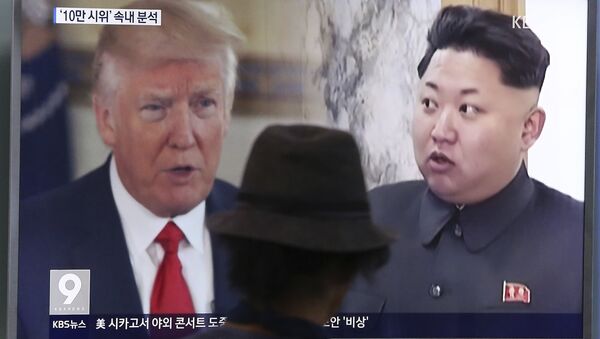Chris Black, an international criminal lawyer, told Radio Sputnik's Loud & Clear that the increasing frustration may be a sign of an imminent US attack on North Korean leader Kim Jong-un's nuclear regime.
Many US military leaders, including Chairman of the Joint Chiefs of Staff Gen. John Dunford and Defense Secretary James Mattis, have expressed fear that military action against North Korea could have catastrophic consequences, as has Secretary of State Rex Tillerson.
But not everyone can express reservations without consequences. In January, the White House withdrew its nomination of Victor Cha as ambassador to South Korea. According to Cha, a Bush administration official and Georgetown University professor, his nomination was retracted after he warned US administration officials against a "preventive" military strike against North Korea.
In a Washington Post article published in January, Cha wrote: "North Korea, if not stopped, will build an arsenal with multiple nuclear missiles meant to threaten the US homeland and blackmail us into abandoning our allies in Asia… These are real and unprecedented threats. But the answer is not, as some Trump administration officials have suggested, a preventative military strike."
"Instead, there is a forceful military option available that can address the threat without escalating into a war that would likely kill tens, if not hundreds, of thousands of Americans," Cha continued.
However, Black believes there might be a more "sinister" explanation to sidelining Cha's nomination.
"I wouldn't want to be an ambassador situated in Seoul if an attack is going to take place quickly. It could be internal politics, that they can't find anybody suitable for that particular position due to policy disputes, but the whole thing has me worried that an attack might take place soon and that's why no US ambassador is being placed in Seoul," Black told hosts John Kiriakou and Brian Becker.
During Trump's first State of the Union address last month, the president heavily criticized Pyongyang, labeling it "reckless" and "depraved."
"North Korea's reckless pursuit of nuclear missiles could soon threaten our homeland… past experience has taught us that complacency and concessions only invite aggression and provocation. I will not repeat the mistakes of past administrations that got us into this dangerous position," Trump said during his January 30 speech.
"We need only look at the depraved character of the North Korean regime to understand the nature of the nuclear threat it could pose to America and our allies," he added.
In response, Rodong Sinmun, North Korea's official party newspaper, recently published an article claiming that Trump's use of human rights as a justification for military action in North Korea is eerily similar to former President George W. Bush's 2002 rhetoric preceding the 2003 invasion of Iraq.
"There is a foolish attempt to make pretense for provocation and pave the road for invasion ahead of conducting the military adventure ‘bloody nose strategy,' " the paper wrote.
The Tuesday article also bashed Trump, saying that the US should "urgently detain Trump" in a mental hospital.
"Dolt-like Trump should know that his backbone would be broken, to say nothing of a 'bloody nose,' and the empire of America would go to hell and the short history of the US would end forever, the moment he destroys even a single blade of grass on this land," the paper added.
Last week, the Pentagon released a revised Nuclear Posture Review that calls for an expansion of America's nuclear arsenal and rules for using them in response to America's geopolitical challenges.
"The recently released Nuclear Policy Review, which is a very aggressive and a very dangerous document because it lowers the threshold for the use of nuclear weapons, makes them almost a conventional weapon that commanders can use in conventional war scenarios," Black explained.


